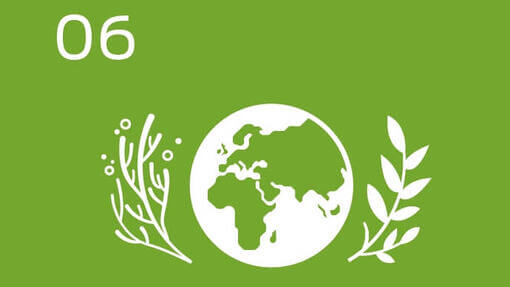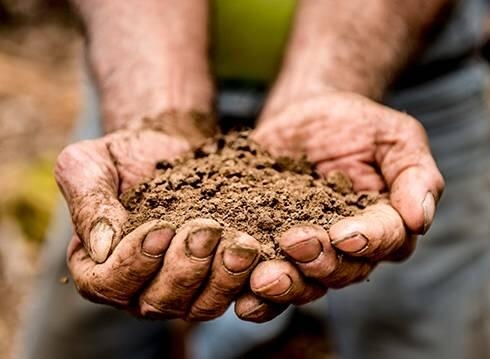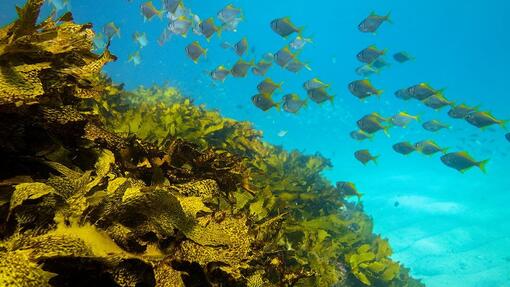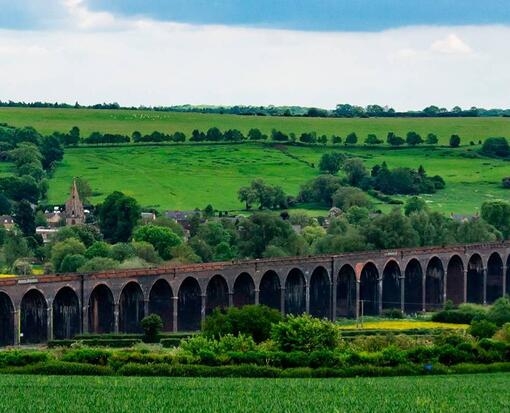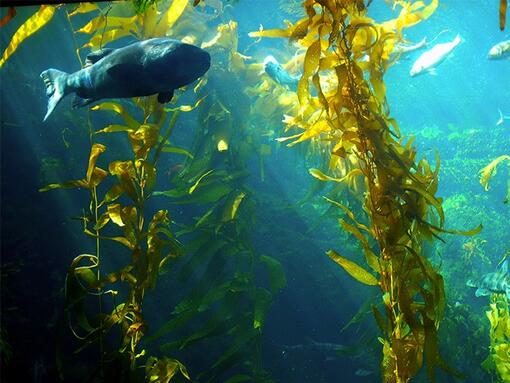
ADVANCE REGENERATION OF SOIL AND OCEAN ECOSYSTEMS
OUR GOAL
We are committed to playing our part to help address the biodiversity loss in our extended supply chain. For example, by supporting cereal and vegetable farmers to transition towards more regenerative agricultural practices, and by partnering with expert marine organisations to help restore marine habitats since fish is part of our supply chain.
Our commitment includes the following 2030 goals:
- We strive to cut our CO2 emissions by 50% in our journey towards Net Zero
- We strive to reduce the excess nitrogen and phosphorus from fertilisers in our agricultural supply chain
- We strive to limit land use as well as improving land quality through regenerative agricultural practices.
- We strive to contribute with our actions to halting the loss of nature and to start reversing this trend by 2030
- We will address bycatch with our global partners for fish e.g. Sustainable Fisheries Partnership (SFP) and will collaborate and support Fishery Improvement Projects (FIPs) related to fish species in our products
- We will support marine habitat restoration projects to help capture more carbon and promote marine biodiversity
With our new Purina commitments, we have broadened the scope and set out a new ambition.
Guided by the Planetary Boundaries Framework (Stockholm Resilience Center) we have looked at the areas that our business impacts the most and we have established targets for 6 out of the 9 planetary boundaries. As there is interconnectivity between the boundaries, our actions aim to positively impact on planetary health holistically to ultimately contribute to the regeneration of our planet.
OUR COMMITMENT
Climate change and biodiversity loss are the most pressing environmental challenges of our time.
Food systems contribute to 80% of global deforestation and are responsible for 29% of green house gas emissions (GHG).
They are as well the single largest cause of biodiversity loss.
We have this decade to halve our global carbon emissions and halt the loss of nature.
With this in mind, our plan is to:
- Source our key ingredients from farmers adopting regenerative agricultural practices to help improve soil health, contributing to the reduction of carbon emissions towards Net Zero.
- Strive to limit our land use and reduce the excess nitrogen and phosphorus from fertilisers in our agricultural supply chain.
- Help advance biodiversity for land and oceans by integrating these actions into our supply chain.
- Action seaweed and seagrass restoration projects to help us capture more carbon and promote biodiversity.
Regenerative practices are ultimately about protecting our oceans and lands from further damage and enabling them to restore their health.
Both, land and ocean are part of the same ecosystem, so we cannot look at one without understanding the impact on the other.
Regenerative agriculture is focused on improving soil health and soil fertility and has multiple benefits. These benefits include removing C02 (carbon dioxide) from the atmosphere and storing it as carbon in soils. Similarly, ocean regeneration can help remove excess carbon dioxide and other pollutants (such as emissions from fertilizer), through capturing emissions in seaweed and storing it in the seabed.
Regenerative practices have an amazing potential to sequester C02 in the soil and ocean. We are working to help support the regeneration of both.
Purina Sustainability Expert
Purina Europe´s Ocean Restoration Programme
Purina Europe´s Ocean Restoration Programme
The ocean is essential for all life on earth, providing food and livelihoods to billions of people across the world. Overfishing, pollution and climate change have damaged nearly half of the world's oceans, resulting in the dramatic loss of marine habitats.
To help tackle this challenge, in February 2024, we launched our first Ocean Restoration Programme which marks our first concrete step towards advancing the regeneration of ocean ecosystems.
Through the programme, we are partnering with expert marine organisations to help restore seagrass, oyster reefs and seaweed, which provide vital habitats for marine life such as fish. The Programme aims to restore 1,500 hectares – the equivalent of around 3,700 football pitches – of marine habitats in Europe by 2030.
Fish is part of Purina´s supply chain because it uses fish by-products, which are parts of fish that are not consumed by humans but provide a valuable ingredient in pet food, so that nothing goes to waste.
We are investing in our partners´ marine restoration solutions, with the aim of making these effective and scalable. Each partner targets species which contribute to restoring locally critical marine habitats that are being lost. The first phase of the programme will last three years, and prioritises the development of research, a measurement framework and the conditions to scale up the restoration solutions efficiently. The second phase is planned to start in 2026, and will focus on scaling the proven solutions.
About our partners and their marine restoration solutions
The Seagrass Consortium, represented by one of its founding partners, Sea Ranger Service, is building solutions to plant seagrass meadows, which are great at capturing carbon and they also provide a home to many species. Oyster Heaven is using natural materials to reconstruct lost oyster reefs. Oysters generate biodiversity, provide a home for a multitude of different species and are natural water filterers, removing pollutants including excess nitrogen which helps improve water quality. Better water quality allows more sunlight to reach the seagrass meadows, enabling them to flourish.
Urchinomics is removing excess sea urchins, which have overgrazed seaweed beds since their natural predators have diminished significantly. Their removal will help seaweed to rebound. Seaweed acts as a natural purifier of water, providing habitats, food, and energy for many marine organisms, whilst absorbing and storing large amounts of carbon. Sea Forester is using techniques such as mobile seaweed nurseries to restore rapidly disappearing seaweed forests.
Restoration efforts will take place in France (Arcachon Bay), the Netherlands (including Zeeland), Norway (Tromsø), and Portugal (Cascais & Peniche), and additional sites in Germany and the UK are being developed.
All these solutions have been piloted in various locations and have the potential to be scaled. They are supported by scientific research and renowned academic organisations, and place a strong emphasis on community and local stakeholder engagement. The programme aims to address the common challenges that the restoration partner organisations typically face. Collaboration between the partners in this programme will help advance science and methodologies in marine habitat restoration.
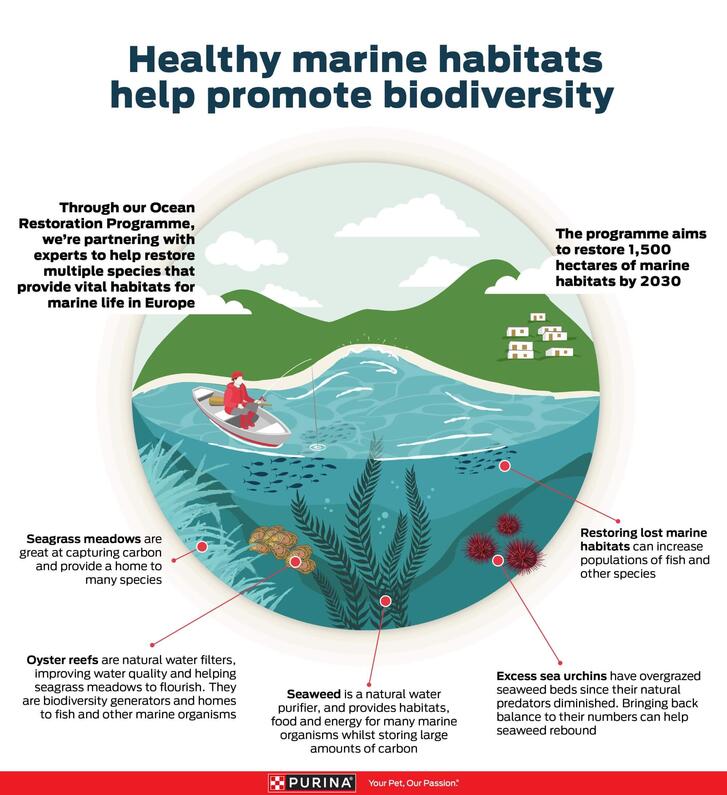
Our work with Landscape Enterprise Network (LENs) UK
SPOTLIGHT ON ONE OF OUR REGENERATIVE AGRICULTURE INITIATIVES
Our work with Landscape Enterprise Network (LENs) UK
Along with Nestlé UK, Nestlé Cereal Partners UK and Anglian Water, Purina UK has invested in a landscape initiative across the region, called Landscape Enterprise Network (LENs). LENs is an independent mechanism through which businesses, with a common interest in protecting the environment, can work together. The farmers involved are being funded to implement measures to take a regenerative approach to farming.
This first project will impact 4,335 hectares of land in the East of England. The measures funded by the deal include: cover crops, which protect water quality and mean soil is less exposed to erosion. Reduced cultivations, to help keep soils healthier and reduce losses of CO2 to the atmosphere. Crops in rotation, to reduce pest pressure, improve soil structure and enable reduced dependency on synthetic fertilisers. And hedge planting, which can create a biodiversity habitat, capture carbon and bring a number of soil health benefits.
These nature-based solutions are fundamental to regenerative farming. In other words, food and pet food can be produced with less impact on the environment, and can even help in regenerating the landscapes which we rely on for our food supply and as places to live in and enjoy.
Building on Nestlé CSV
Just as we are committed to improving the lives of pets and the people who love them, our parent company Nestlé, is committed to enhancing quality of life and contributing to a healthier future for individuals and families, our communities and the planet.
